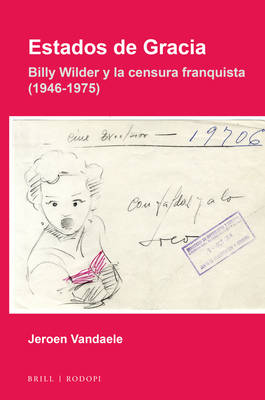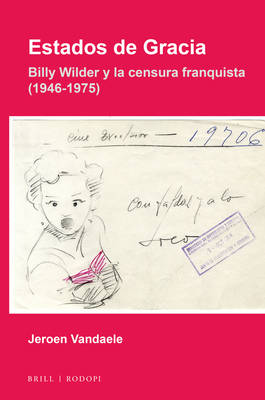
- Afhalen na 1 uur in een winkel met voorraad
- Gratis thuislevering in België vanaf € 30
- Ruim aanbod met 7 miljoen producten
- Afhalen na 1 uur in een winkel met voorraad
- Gratis thuislevering in België vanaf € 30
- Ruim aanbod met 7 miljoen producten
Zoeken
Estados de Gracia: Billy Wilder Y La Censura Franquista (1946-1975)
Jeroen Vandaele
€ 184,95
+ 369 punten
Omschrijving
Billy Wilder is more popular and glorified in Spain than anywhere else. Estados de Gracia traces this remarkable fact back to Wilder's key role in renewing the film repertoire under Franco. Even though Wilder's films were rewritten and censored in Francoist Spain, many viewers still found them far more exciting than most domestic productions.
Drawing on a wealth of censorship files, reviews and dubbings, Estados de Gracia illuminates this paradoxical process of canonization despite censorship. Vandaele studies the censors and their activities, the manipulative translations, and the Francoist system of norms applied to Wilder. He also asks if Wilder's humor somehow helped subvert that system and signals that the Spanish dubbings shown today are still partly Francoist.
Billy Wilder es más popular y glorificado en España que en cualquier otro país. Estados de Gracia relaciona esta observación con el papel clave que desempeñó Wilder en la renovación del repertorio cinematográfico bajo Franco. Aunque manipuladas, sus películas encarnaban para muchos espectadores algo emocionante en vez de dogmáticamente franquista.
Apoyándose en informes de censura, reseñas y doblajes franquistas, Vandaele ilumina este paradójico proceso de canonización y censura. Estudia a los censores y sus actividades, las traducciones manipulativas, y el sistema normativo franquista aplicado a Wilder. Investiga si el humor de Wilder contribuyó posiblemente a subvertir dicho sistema y señala que muchos doblajes que circulan hoy en día todavía presentan reminiscencias del franquismo.
Drawing on a wealth of censorship files, reviews and dubbings, Estados de Gracia illuminates this paradoxical process of canonization despite censorship. Vandaele studies the censors and their activities, the manipulative translations, and the Francoist system of norms applied to Wilder. He also asks if Wilder's humor somehow helped subvert that system and signals that the Spanish dubbings shown today are still partly Francoist.
Billy Wilder es más popular y glorificado en España que en cualquier otro país. Estados de Gracia relaciona esta observación con el papel clave que desempeñó Wilder en la renovación del repertorio cinematográfico bajo Franco. Aunque manipuladas, sus películas encarnaban para muchos espectadores algo emocionante en vez de dogmáticamente franquista.
Apoyándose en informes de censura, reseñas y doblajes franquistas, Vandaele ilumina este paradójico proceso de canonización y censura. Estudia a los censores y sus actividades, las traducciones manipulativas, y el sistema normativo franquista aplicado a Wilder. Investiga si el humor de Wilder contribuyó posiblemente a subvertir dicho sistema y señala que muchos doblajes que circulan hoy en día todavía presentan reminiscencias del franquismo.
Specificaties
Betrokkenen
- Auteur(s):
- Uitgeverij:
Inhoud
- Aantal bladzijden:
- 366
- Taal:
- Spaans
- Reeks:
- Reeksnummer:
- nr. 50
Eigenschappen
- Productcode (EAN):
- 9789004297333
- Verschijningsdatum:
- 9/04/2015
- Uitvoering:
- Paperback
- Formaat:
- Trade paperback (VS)
- Afmetingen:
- 155 mm x 235 mm
- Gewicht:
- 570 g

Alleen bij Standaard Boekhandel
+ 369 punten op je klantenkaart van Standaard Boekhandel
Beoordelingen
We publiceren alleen reviews die voldoen aan de voorwaarden voor reviews. Bekijk onze voorwaarden voor reviews.











